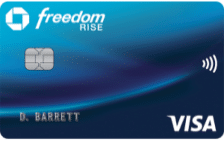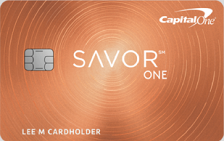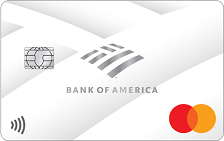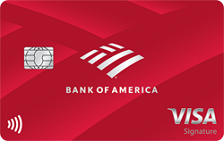Filter Options
×-
-
Unselect all
-
Unselect all
-
Unselect all

Showing 33 Cards
Sort By Column Name:
Chase Freedom Rise

Chase Freedom Rise
- 26.24% variable based on the Prime Rate Regular Purchase APR
- 26.24% variable based on the Prime Rate Balance Transfer APR
- 29.49% variable based on the Prime Rate Cash Advance APR
At a Glance
The Chase Freedom Rise Visa is a credit builder card that can help you earn cash back rewards and double your credit line fast. The card works best with an eligible Chase checking account, as having one can greatly improve your approval odds.
- Best Benefits
- Rates & Fees
- Why Should You Apply?
- Earn 1.5% in cash back for all of your purchases
- Earn a $25 bonus for enrolling in in the first three months
- $0 annual fee
- Increase your credit line with 6 on-time payments
- Regular Purchase APR: 26.24% variable based on the Prime Rate
- Balance Transfer APR: 26.24% variable based on the Prime Rate
- Balance Transfer Transaction Fee: Either $5 or 5% of the amount of each transfer, whichever is greater
- Cash Advance APR: 29.49% variable based on the Prime Rate
- Cash Advance Transaction Fee: Either $10 or 5% of the amount of each transaction, whichever is greater
- Penalty APR: Up to 29.99%
- Foreign Transaction Fee: 3% of the amount of each transaction in U.S. dollars.
- Late Payment Penalty Fee: Up to $40
- Return Payment Penalty Fee: Up to $40
- You have a Chase checking account with a $250 balance
- You want to earn unlimited 1.5% cash back on all purchases
- You are new to credit cards
- You don't want to pay an annual fee
Bank of America® Unlimited Cash Rewards Credit Card for Students

Bank of America® Unlimited Cash Rewards Credit Card for Students
- 18.24% to 28.24% variable based on creditworthiness and the Prime Rate Regular Purchase APR
- 18.24% to 28.24% variable based on creditworthiness and the Prime Rate Balance Transfer APR
- 21.24% to 30.24% variable based on creditworthiness and the Prime Rate Cash Advance APR
- 0% for 15 months Intro Purchase APR
At a Glance
The Bank of America® Unlimited Cash Rewards Credit Card for Students is the ideal mix of excellent rewards, a decent sign-up bonus, and a competitive APR. The card, which has no annual fee, also gives students the credit building tools they need to succeed – including FICO Score and Bank of America’s financial education program access.
- Best Benefits
- Rates & Fees
- Why Should You Apply?
- No annual fee
- Unlimited 1.5% cash back on every purchase
- Build credit with responsible use
- 0% introductory APR for 15 months from account opening
- Intro Purchase APR: 0% for 15 months
- Regular Purchase APR: 18.24% to 28.24% variable based on creditworthiness and the Prime Rate
- Intro Balance Transfer APR: 0% for 15 months for transactions made within 60 days of account opening
- Balance Transfer APR: 18.24% to 28.24% variable based on creditworthiness and the Prime Rate
- Balance Transfer Transaction Fee: Either $10 or 5% of the amount of each transaction, whichever is greater
- Cash Advance APR: 21.24% to 30.24% variable based on creditworthiness and the Prime Rate
- Cash Advance Transaction Fee: Either $10 or 3% of the amount of each transaction, whichever is greater
- Penalty APR: Up to 29.99%
- Foreign Transaction Fee: 3% of the U.S. dollar amount of each transaction in U.S. dollars
- Late Payment Penalty Fee: Up to $40
- Return Payment Penalty Fee: Up to $29
- You're a college student
- You want an accelerated cash back earning rate
- You plan to make use of the financial education tools
- You don’t want to pay an annual fee
Wescom Bruin Choice Visa® Credit Card

Wescom Bruin Choice Visa® Credit Card
- 17.40% to 27.40% variable based on creditworthiness and the Prime Rate Regular Purchase APR
- 17.40% to 27.40% variable based on creditworthiness and the Prime Rate Balance Transfer APR
- 17.40% to 27.40% variable based on creditworthiness and the Prime Rate Cash Advance APR
- 0% for 6 months from account opening date Intro Purchase APR
At a Glance
The Wescom Bruin Choice Visa® Credit Card helps UCLA students build credit and earn rewards at the same time. The card is a credit union and student credit card that offers 0% intro APR, no foreign transaction fees, and up to 5X point son purchases – all for no annual fee.
- Best Benefits
- Rates & Fees
- Why Should You Apply?
- No annual fee
- No foreign transaction fees
- Earn 5X points on select UCLA purchases
- Earn 1.5X points on all other purchases
- 0% intro APR for 6 months on purchases and balance transfers
- Credit limits of up to $1,000
- Intro Purchase APR: 0% for 6 months from account opening date
- Regular Purchase APR: 17.40% to 27.40% variable based on creditworthiness and the Prime Rate
- Intro Balance Transfer APR: 0% for 6 months from account opening date
- Balance Transfer APR: 17.40% to 27.40% variable based on creditworthiness and the Prime Rate
- Balance Transfer Transaction Fee: Either $2 or 2% of the amount of each transfer, whichever is greater
- Cash Advance APR: 17.40% to 27.40% variable based on creditworthiness and the Prime Rate
- Cash Advance Transaction Fee: Either $2 or 2% of the amount of each cash advance, whichever is greater
- Late Payment Penalty Fee: Up to $15
- Return Payment Penalty Fee: Up to $25
- You attend UCLA
- You're new to credit cards
- You want to earn savings at a selection of campus dining options
- You do't want to pay an annual fee
SoFi Credit Card

SoFi Credit Card
- 17.99% to 29.99% variable based on creditworthiness and the Prime Rate Regular Purchase APR
- 17.99% to 29.99% variable based on creditworthiness and the Prime Rate Balance Transfer APR
- 31.99% variable based on the Prime Rate Cash Advance APR
At a Glance
The SoFi Credit Card is a cash back rewards card from fintech company, SoFi. The card, which features no annual fee and no foreign transaction fees, is designed to help consumers pay down debt quickly and effectively.
- Best Benefits
- Rates & Fees
- Why Should You Apply?
- Earn 1% cash back on all eligible purchases. When you redeem it to pay down eligible debt, save, or invest with SoFi, you'll earn an additional 1% cash back
- Get a 1% lower APR when you make 12 on-time payments
- No annual fee
- Earn additional rewards when you spend with Lyft, ShopRunner, and Boxed
- Regular Purchase APR: 17.99% to 29.99% variable based on creditworthiness and the Prime Rate
- Balance Transfer APR: 17.99% to 29.99% variable based on creditworthiness and the Prime Rate
- Balance Transfer Transaction Fee: Either $10 or 5% of the amount of each transfer, whichever is greater
- Cash Advance APR: 31.99% variable based on the Prime Rate
- Cash Advance Transaction Fee: Either $10 or 5% of the amount of each cash advance, whichever is greater
- Late Payment Penalty Fee: Up to $39
- Return Payment Penalty Fee: Up to $39
- You're an existing SoFi customer or are planning to become one
- You have debts you want to pay down at a reduced rate
- You have the desire to earn a lower rate with on-time payments
- You don’t want to pay an annual fee or foreign transfer fee
Capital One SavorOne Student Cash Rewards Credit Card

Capital One SavorOne Student Cash Rewards Credit Card
- 19.99% - 29.99%% variable based on creditworthiness and the Prime Rate Regular Purchase APR
- 19.99% - 29.99%% variable based on creditworthiness and the Prime Rate Balance Transfer APR
- 29.99% variable based on the Prime Rate Cash Advance APR
At a Glance
The Capital One SavorOne Student Cash Rewards Credit Card provides college and graduate students with the tools they need to build credit – and the rewards they want to enjoy campus life. The card from Capital One features 3% back on select entertainment and everyday purchases and features no annual fee, balance transfer fees, or foreign transaction fees.
- Best Benefits
- Rates & Fees
- Why Should You Apply?
- Earn unlimited 3% cash back on dining, entertainment, popular streaming services and at grocery stores (excluding superstores like Walmart® and Target®), with 1% on all other purchases
- Limited Time Offer: Earn $50 when you spend $100 in the first three months
- Earn 10% cash back on purchases made through Uber & Uber Eats, plus complimentary Uber One membership statement credits through 11/14/2024
- Enjoy peace of mind with $0 Fraud Liability so that you wo't be responsible for unauthorized charges
- Enjoy no annual fee, foreign transaction fees, or hidden fees
- Lock your card in the Capital One Mobile app if it's misplaced, lost or stolen
- Earn up to $500 a year by referring friends and family when they're approved for a Capital One credit card
- Earn 8% cash back on entertainment purchases when you book through the Capital One Entertainment portal
- Build your credit with responsible card use
- Whether you're at a 4-year university, community college or other higher education institution, this card might be an option for you
- Regular Purchase APR: 19.99% - 29.99%% variable based on creditworthiness and the Prime Rate
- Balance Transfer APR: 19.99% - 29.99%% variable based on creditworthiness and the Prime Rate
- Balance Transfer Transaction Fee: 3% of the amount of each transferred balance that posts to your account at a promotional APR that we may offer you.; None after that
- Cash Advance APR: 29.99% variable based on the Prime Rate
- Cash Advance Transaction Fee: 3% of the amount of the cash advance, but not less than $3
- Late Payment Penalty Fee: Up to $40
- You're a student
- You frequently dine out or make purchases in the entertainment category
- You want a cash back credit card with no annual fee and no foreign transaction fees
- You want to build credit while earning quality rewards
You've viewed 5 of 33 credit cards
What Is a Student Credit Card?
A student credit card is a specialized type of card designed specifically for college students. It is an ideal option for those over 18 who are new to credit. While student cards offer reward points, interest-free periods, and introductory bonuses like other credit cards, they also have some key differences.
Why Choose a Student Credit Card?
Student credit cards can be a powerful and practical tool for financial success during your college years and beyond. As a student, you may be starting to establish your credit history, and a student card can provide a convenient option.
One of the primary advantages of a student credit card is that it allows you to start building a credit history at an early age. Establishing a positive credit history is crucial for your future financial life, including things like renting an apartment, getting a mortgage, or applying for a car loan. By responsibly using a student credit card, you can demonstrate to banks and lenders that you are a responsible borrower, improving your chances of obtaining better credit offers in the future.
How Do Student Cards Differ from Regular Credit Cards?
Because student cards are designed with the college student in mind, they typically have different credit and income requirements, rewards, and sometimes fees versus traditional credit cards. Here are how regular cards and student credit cards differ:
| Student credit card | Other credit cards | |
|---|---|---|
| Target Audience | Specifically designed for college students | Generally for individuals with established credit history and higher credit scores |
| Credit Requirements | Lower requirements for credit score and credit history | Typically require a higher credit score and credit history |
| Age Requirement | No specific age requirement, but issuers usually require cardholders to be at least 18 years old. | No specific age requirement, but cardholders are typically required to be at least 18 years old. |
| Credit Limits | Lower credit limits due to relaxed credit restrictions | Higher credit limits due to stricter credit requirements |
| Benefits | More lenient credit requirements, beneficial for those new to credit cards | Offer better rewards and perks due to the higher credit requirements |
| Credit Building | Helps students build credit history and score | Often used by individuals with established credit history to earn rewards and manage expenses |
| Financial Power | Provides enough power to purchase textbooks, dorm snacks, and other college necessities | Offers greater purchasing power and flexibility for various expenses and purchases |
Benefits of Student Credit Cards
Student credit cards offer a range of benefits for students who are looking to build their credit history and manage their finances responsibly. Here are some key advantages of using student credit cards:
Establishing Credit History
Student credit cards allow students to establish a positive credit history, which is essential for future financial endeavors such as applying for car loans or mortgages. Because student cards have lower credit requirements, they provide access to unsecured credit for a population segment that might otherwise miss out.
Teaching Financial Responsibility
These credit cards encourage responsible financial habits by requiring students to manage their spending, make regular payments, and stay within their credit limit, thus helping them develop a strong foundation in handling their finances.
Serving as Emergency Funds
Student credit cards can act as a financial safety net in case of unexpected events, providing students with peace of mind and a backup plan for emergencies like car repairs or medical expenses.
Rewards Programs and Perks
Some student credit cards offer access to rewards programs, cash back rewards, or other perks that help students save money on their everyday purchases, allowing them to stretch their budgets further and make their money work for them.
Security Measures
Many student credit cards come with features that safeguard against unauthorized purchases and provide protection in case of identity theft, ensuring that students can use their credit cards with confidence. Credit cards provide an additional layer of fraud protection versus debit cards, making them a great option for security-conscious students.
How to Choose a Student Card
With so many options available, choosing the right student credit card can be overwhelming. Here are some factors to consider when making your decision:
- Annual fees: Some student credit cards have annual fees, while others do not. Consider whether the rewards and benefits offered by the card justify the fee.
- Interest rates: Look for a competitive card, especially if you anticipate carrying a balance on your card. Lower interest rates can save you money in the long run.
- Credit limits: Different student credit cards offer different credit limits. Consider your spending habits and choose a card that provides a credit limit that suits your needs.
- Reputation and customer service: Research the credit card issuer’s reputation and read reviews about its customer service. A reliable issuer with good customer service can make your experience with the card more pleasant.
- Additional benefits: Some student credit cards offer additional perks like purchase protection, extended warranties, or travel insurance.
Things to Consider Before Getting a Student Card
While student cards sound impressive, there are limitations to these credit cards. Here are some critical things you need to consider before applying for a new student credit card:
High-Interest Rates
Student credit cards often have higher interest rates than other types of credit cards, which can lead to significant interest charges if the balance is not paid in full each month.
Credit Limit Restrictions
Student credit cards typically have lower credit limits than regular credit cards, which may restrict purchasing power. These reduced credit lines help students gain experience with credit at a much lower risk level but might impact your available credit for larger purchases, like books, each semester.
If You Are Under 21
While student credit cards have lower credit and income requirements, they might still be out of reach for applicants too young to establish a personal income. If you’re under 21 and don’t have your own income, you will need a parent or trusted adult to co-sign for you on your credit card application.
What Is a Cosigner?
A cosigner is a person who signs a credit card application with someone and agrees to take on the burden of their debt if they are unable to make their payments. Essentially, a cosigner acts as a guarantor for the credit card application, providing reassurance to lenders when dealing with risky applicants, such as students.
Benefits of Having a Cosigner
Having a cosigner can make student credit card applicants more attractive to lenders. It also opens up opportunities for more enticing credit card offers that they may not have qualified for otherwise. These offers can include rewards credit cards, such as cashback or travel rewards cards, which can help students save money on everyday purchases or even trips back home during the holidays.
The CARD Act of 2009
The CARD Act of 2009 is a federal law that mandates certain requirements for individuals under the age of 21 who wish to obtain a credit card. According to this law, there are strict limits on the amount of credit available to individuals in this age group, as well as regulations on the marketing practices of credit card lenders. These regulations were implemented to protect students who may lack the financial education necessary to make informed decisions.
Under the CARD Act, individuals between the ages of 18 and 20 must provide valid proof of independent income to cover their credit card obligations. This income must be separate from any financial support they receive from their family, such as allowances or birthday presents.
Due to the challenges faced by individuals under the age of 21 in proving sufficient income to cover potential credit card debt, it can be difficult for them to be approved for anything other than basic credit cards or secured credit cards. However, students also have the option of using a parent, guardian, or other trusted loved one as a cosigner to increase their chances of approval.
Tips for Getting the Most Out of Your Student Credit Card
To make the most of your student credit card, consider these tips:
- Use your rewards: Take advantage of the rewards and benefits offered by your student credit card. Redeem your rewards regularly to maximize their value.
- Track your spending: Monitoring your spending habits can help you stay within your budget and adjust as needed. Many student credit cards offer online tools or apps that can help you track your expenses.
- Review your statement: Review your credit card statement each month. Look for errors or unauthorized charges and report them immediately.
- Upgrade to a regular credit card: Once you graduate and establish a positive credit history, you may be eligible for a regular credit card with even more benefits and rewards. Consider upgrading to a card that aligns with your future financial goals.
When to Sign Up for a Student Credit Card, and When to Choose a Different Course
If you’re a student with a source of income but don’t have an extensive credit history, student credit cards may be your best option. Not only are you more likely to qualify for a student credit card in these situations, but you’ll also be able to start building up your credit score. Demonstrating your creditworthiness through responsible use of a student credit card will make it easier for you to qualify for major purchases, such as a vehicle or real estate, in the future.
When considering student credit cards, look for ones that offer cash back or points for purchases in categories where you already spend money, such as shopping in bulk at a local wholesale club. Also, consider cards with debt forgiveness and no annual fee. While it may be challenging to navigate life on your own at first, having the right student credit card will help you graduate to bigger and better cards in no time.
Mistakes to Avoid
While student credit cards can be beneficial, it’s important to be aware of common mistakes that students often make. Avoiding these mistakes can help you maintain a healthy financial situation:
- Maxing out your credit card: Using up your entire credit limit can negatively impact your credit score and increase your debt burden. Aim to keep your credit utilization ratio low.
- Making only minimum payments: Making minimum credit card payments can result in high interest charges and a longer time to pay off your debt. Always strive to pay more than the minimum amount due.
- Ignoring your credit card statements: Failing to review your credit card statements can lead to missed errors or fraudulent charges. Make it a habit to check your statements regularly and report any discrepancies.
- Applying for multiple credit cards: Opening multiple credit card accounts can make it difficult to keep track of your spending and payment due dates. Stick to one or two credit cards and manage them responsibly.
5 Tips to Save You Money During College
It can be challenging to balance expenses and save money at the same time as a college student. However, developing good saving habits early on in life can help you achieve financial stability in the long run. Here are some helpful tips for saving money in college:
Create a Budget (and Stick to It)
Saving money in college starts with setting a reasonable budget. Nowadays, most students make payments with cards or mobile wallets, making it easy to spend more money than expected quickly. Setting a reasonable budget can help eliminate over-spending and the inevitable scramble for money when the semester is nearly over.
To create a budget, carefully consider the types of purchases that are essential each month, including textbooks and school supplies, food, clothing, and entertainment. Also, ensure that the budget includes enough wiggle-room to ensure that any unexpected costs won’t break the bank and lead to empty pockets.
Once the budget is set, spend with consideration. For example, instead of meeting friends for coffee at a café every day, why not break a cup at home and put it in a travel mug and then meet up on campus instead?
Shop Smart by Using Online Deals and Coupons for Essentials
Shopping in-store offers plenty of benefits but buying online is one of the best ways to save money, thanks to online coupon and deal sites. Online shopping allows students to find coupons that they might have otherwise missed and stack those coupons with another manufacturer, payment network, or merchant offers.
When you stack deals, you add payment network deals to merchant coupons. Like Visa and Mastercard, payment networks provide exclusive savings to cardholders – regardless of if they have a debit or credit card. Stacking deals and coupons can provide significant savings – savings that only increase with free shipping or delivery that saves students money on gas.
Using a quality deals portal (like BestCards Membership) allows students to find deals from thousands of leading retailers, as well as network-specific deals from their bank or card issuer. Students can even earn cash back on select purchases – and even more cash back when they invite their friends or family to join and make eligible purchases through the portal. Even better, BestCards Membership is free to join.
Take Advantage of Credit Card Bonus Categories
An increasing number of credit card issuers are providing more lucrative rewards cards to students than ever before. Bank of America, for example, offers an impressive lineup of rewards credit cards for students, including the Bank of America® Travel Rewards Credit Card for Students, the Bank of America® Unlimited Cash Rewards Credit Card for Students, and the Bank of America® Customized Cash Rewards Credit Card for Students.
These cards offer enhanced rewards on all eligible purchases, with the Unlimited Rewards earning 1.5% cash back – and the Travel Rewards earning 1.5X points back – on all purchases. The Customized Cash Student Card, on the other hand, offers accelerated rewards of up to 3% cash back on the category of the student’s choice, with options including:
| Gas | Dining | Online shopping |
| Travel | Drug stores | Home improvement |
Other banks also provide excellent rewards credit cards for students. These include offers from national banks (Discover, Capital One, etc.), and regional banks and credit unions – including the new Wescom Bruin Choice Visa® Credit Card for UCLA students, from Wescom Credit Union.
For more information on college credit cards, check out our dedicated Student Credit Cards page. Always make sure you carefully weigh the benefits of a credit card before applying to ensure you maximize the categories and receive the most value from your new card.
Good Grades Discounts
Some card issuers provide good grade discounts and rebates for students that hold their credit cards and perform well in the classroom. Discover offers one of the most prominent “good grade” bonuses with its Good Grade Reward. If students keep their GPA above 3.0, Discover will reward cardholders with a $20 statement credit each school year. Since this bonus is good for up to five academic years, the total reward has a value of up to $100 – just for studying. This bonus applies to both the Discover It Chrome for Students and the Discover It Student Cash Back.
Pay Your Balance On-Time Every Month
Paying your credit card balance on time (and in full) every month is essential to saving money during your college years. Payment history is the single-largest impactor on FICO Scores, with just one late payment capable of ruining a young credit history.
FAQs
There are plenty of questions that pop up about college credit cards. Here are some of the most commonly asked questions:
- Student cards are similar to other credit cards. These cards differ in that they are meant for college students. Because of this, student cards require specific information. Some of this information is the same as what all credit card applications require:
- A Social Security Number is required whenever you apply for a credit card. Despite this, some applications have no impact to your credit score.
- Proof of enrollment is another requirement for many student cards.
- Income or savings information might be required.
- Some issuers require a student card applicant to have a student loan with the bank.
- Students are required to be 18 years or older to get a student card.
- Yes. Student cards are an excellent option for establishing a good credit history. Student versions of credit cards offer lower interest rates than secured cards. These varieties of cards also provide rewards, cash back, and other perks.
- Most credit cards come with an easy to use app, which allows you to track your spending, set automatic payments, or even check your credit score in minutes. Other cards offer good grade discounts, free subscriptions (like a free year of Amazon Prime student), or other on-campus perks.
- International transaction fees are charges for using your credit card for purchases outside the United States. These charges can be in foreign countries or even non-U.S. websites. Each bank charges a different fee, with some having no foreign transaction fees at all.
Conclusion
Student credit cards can be a valuable tool for building credit and learning responsible financial habits. By choosing the right card, understanding credit scores, and using your card responsibly, you can unlock the power of student credit cards for financial success. Avoid common mistakes, manage your debt effectively, and take advantage of available resources to maximize the benefits of your student credit card. With careful planning and responsible usage, your student credit card can set you on the path to a bright financial future.
Editorial Disclosure – The opinions expressed on BestCards.com's reviews, articles, and all other content on or relating to the website are solely those of the content’s author(s). These opinions do not reflect those of any card issuer or financial institution, and editorial content on our site has not been reviewed or approved by these entities unless noted otherwise. Further, BestCards.com lists credit card offers that are frequently updated with information believed to be accurate to the best of our team's knowledge. However, please review the information provided directly by the credit card issuer or related financial institution for full details.



